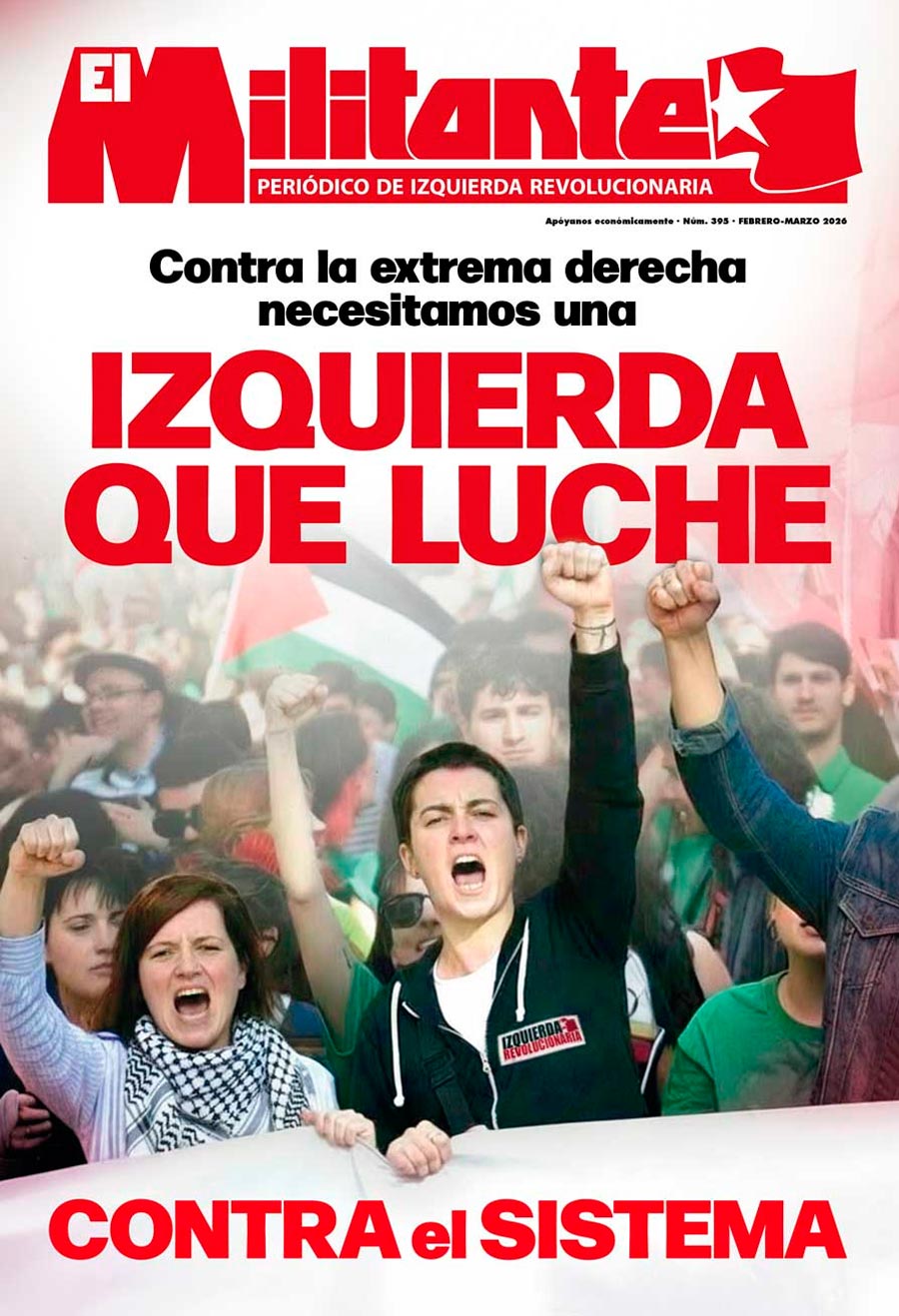The struggle of the Kurdish people at a turning point
Syria is the scene of yet another example of the scandalous and manipulative behaviour to which we are accustomed by the Western media.
Terrorists who used to fly the flag of jihadism have overnight become honourable ‘rebels’, lovers of ‘liberal democracy’ who dress like your gentle neighbour and softly propagate, as their CIA mentors have instructed them, the idea that they can build an oasis of tolerance and respect for human rights.
A nauseating farce, for it is impossible to hide the fact that these puppets of Washington, Ankara and Tel Aviv are fundamentalist fascists from ISIS and Al-Nusra (the Syrian branch of Al Qaeda), and have for years been perpetrating massacres to impose a fundamentalist dictatorship, subjecting women to brutal oppression in the regions they control, and unleashing systematic terror against the Shia population, and Christian and Alawite communities.
It has only taken a few weeks for the territorial division being negotiated by three parties (the US, Israel and Turkey) to become evident, with the consequent blow to their adversaries (Iran, Russia and China). But there is also another operation underway that raises enormous fears after seeing the genocidal massacres of Zionism in Gaza, the West Bank and Lebanon.
We are talking about the future of the heroic struggle of the Kurdish people and the survival of the enclave of Rojava, one of the most cherished war aims of Erdogan's reactionary Bonapartist regime. After holding out for a decade with significant military victories against the jihadists, the Kurdish organisations in Rojava and the PKK, which is their political inspiration, are facing a historic crossroads of great significance. And it is far from clear how the challenge will be resolved.
With this statement we would like to present a general assessment of the current situation and outline possible perspectives, taking into account the complicated scenario and the enormous contradictions that have become interwoven.
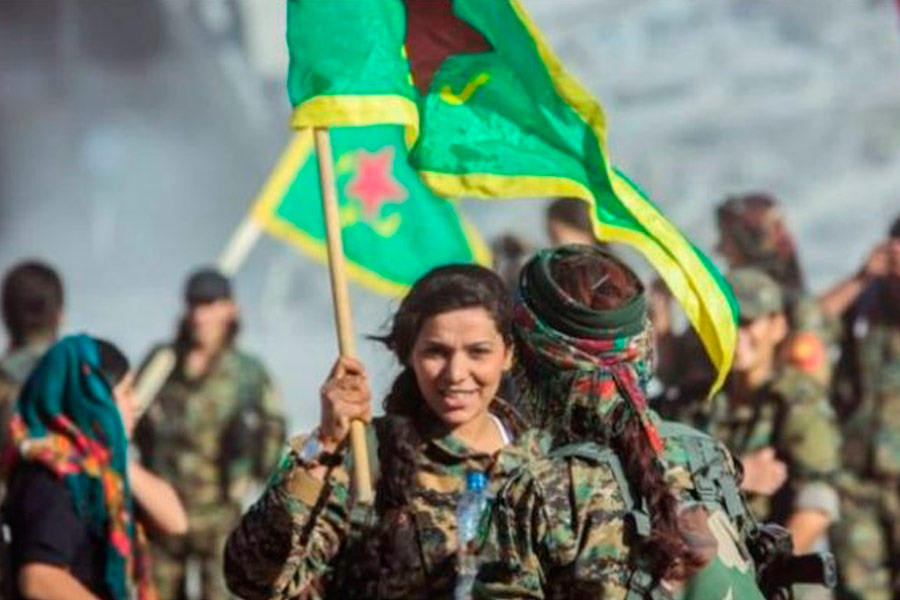
The imperialist Great Game in Syria
After the capture of Aleppo by the Hayat Tahrir al Shar (HTS), the Syrian National Army (SNA), under Ankara's command, announced Operation Dawn of Freedom, militarily occupying the Kurdish towns of Tell Rifaat and Manbij, as well as other nearby towns. This operation does not hide his intention to carry to the end the offensives of 2018 and 2019, when Turkish aviation and troops, together with their Syrian pawns, caused thousands of deaths and the displacement of more than 200,000 civilians in Afrin and other Kurdish regions.[1] On that occasion Erdogan already had the authorisation of Donald Trump's US government to carry out the massacre.
But the offensive on Tell Rifaat and Manjib is part of a much larger political and military plan: to liquidate the Autonomous Democratic Administration of Northern and Eastern Syria (AANES), better known as Rojava, an enclave inhabited by more than two million people, mostly Kurds but also Arabs, Turkmen, Yazidis, Armenians and other minorities.
Erdogan has made clear what he expects: ‘We do not believe that, in the short term, any power will continue to collaborate with terrorist organisations. The leaders of terrorist organisations like the Islamic State and the PKK-YPG will be crushed as soon as possible.‘[2] The identification of a fundamentalist organisation as hated in the Arab world and internationally as the Islamic State with the Kurdish guerrilla Kurdish Workers’ Party (PKK), which still maintains a powerful influence in southern Turkey, and with its Syrian allies in the PYD, who run the People's Protection Units (YPG) and Women's Defence Units (YPJ) is no coincidence.
This rotten nationalist, who has for years resorted to populist demagogy and swings between the world powers, has not hesitated to launch a bloody intervention in Syria that allows him to divert attention from the very serious problems facing Turkish society.
On the one hand, it plans a massacre against the Kurds in Syria and sends a strong message to the 15-20 million Kurds (almost 20 per cent of the population) living in Turkey. The supposed fight against ‘Kurdish terrorism’ serves as a convenient way for him to strike at the left and widen his fanatical and nationalist base. On the other hand, the idea that the Turkish economy could feel a significant relief if the problem of the 2.9 million Syrian refugees still on Turkish soil is solved by a mass expulsion of them.
Both arguments serve as a decoy to cover up the expansionist ambitions of Erdogan and the Turkish bourgeoisie in what they consider their immediate area of influence, and allow them to deliver a severe blow to their most important adversary in the region: the Iranian dictatorship of the mullahs.
Erdogan has skilfully exploited the international context and particularly events in Lebanon and Gaza. For two years he has played a cat-and-mouse game with Western powers to which he is bound by multiple pacts. Turkey is a NATO member, but has played a highly questionable role for Washington and Berlin by allowing Russian companies to establish themselves in the country and weave a network of commercial intermediaries to circumvent Western sanctions. For a time it vetoed Scandinavian countries' entry into NATO on the grounds that they were sanctuaries of the PKK. And his relations with China have also grown stronger in recent years.
As a restive Bonapartist, Erdogan has played with different decks of cards to survive. The quality of Turkey's democracy is in tatters everywhere, but it is a political actor that no power with interests in the region can ignore. The EU generously finances Erdogan so that his military and police apparatus can contain millions of refugees from the Middle East and Asia within Turkey's borders, with no concern for the trampling of basic human rights.
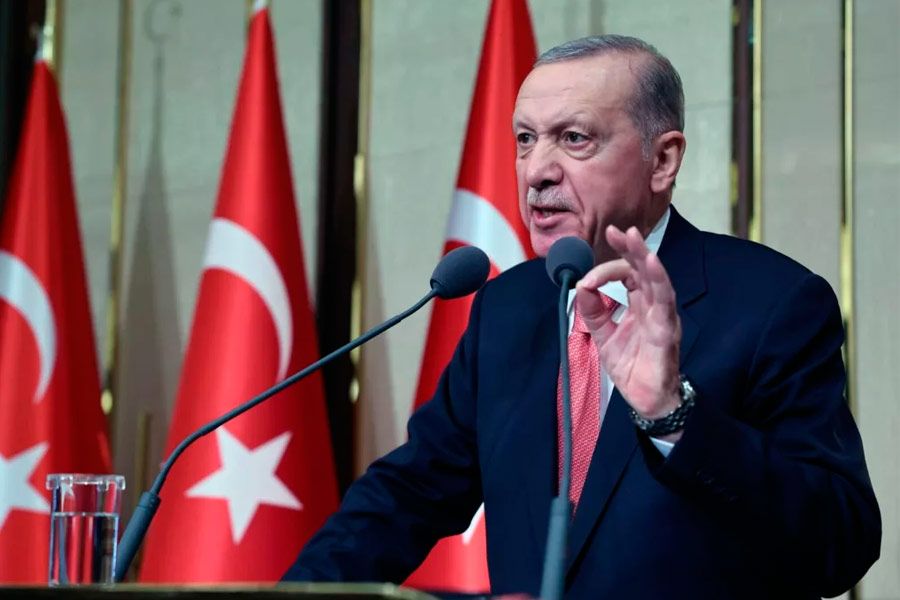
This rotten pragmatism to which we are accustomed in the US and the EU is also well mastered by Erdogan. His speeches in favour of the Palestinian cause have been resounding, but while he makes them he maintains excellent commercial and military relations with Netanyahu, and now he has seen a window of opportunity in Syria to take control of the north of the country and deal a crushing blow to the Kurdish forces.
Not so long ago some deluded people on the left, who instead of engaging in serious class analysis played at geo-strategic calculation, saw Erdogan as an ally because he supported Putin. Today they are hiding under the table, not knowing what to say.
Erdogan has re-established his military and political alliance with the US to allow Washington to overthrow the al-Assad regime and at the same time watch with complicit silence the onslaught of Zionist forces on Syrian territory. A great lesson for all those who rely on the gestures and words of characters like the Turkish president, and think that the Palestinian cause can benefit from this kind of demagogy.
The Democratic administration was well aware that the Syrian regime lacked a social base and that Russia's chances of diverting large military resources were limited by the Ukrainian conflict. The strategic commanders of US imperialism did not hesitate to plan, with their Turkish and Israeli allies, an operation that would allow them to regain positions and authority after the defeats suffered in Iraq, in Afghanistan, in Syria itself since Russia's military breakthrough in 2015 and, obviously, in Ukraine. They have allies on the ground, as well as considerable intelligence resources, to appreciate every major change. And obviously the Zionist offensive in Lebanon and the decapitation of Hezbollah offered a golden opportunity.
It was a win-win situation for the US and of course for Israel, which has already extended its control beyond the Golan Heights. Turkey, for its part, is asserting itself as a regional power and by seizing Tell Rifaat and Manjib ‘has consolidated its control over key areas west of the Euphrates and created a new buffer zone along its territorial boundaries.’[3]
The Kurdish liberation struggle and Rojava
The intervention in Syria opens up a rather serious prospect for Erdogan to seize one of the most precious spoils of war: the enclave of Rojava, an international symbol of Kurdish resistance and where the PKK and its allies have built up an entire political, social and economic administration.
We will not dwell on the well-known fact that the Turkish regime has oppressed the Kurds since its foundation, denying them the right to self-determination, banning their language and culture, and even rejecting their existence as a people by calling them ‘mountain Turks’. The Kurdish people are the largest stateless nation on the planet. Kurdistan, with an area similar to the Iberian Peninsula and almost 40 million inhabitants, remains divided between Turkey (15-20 million), Iran (approximately 10 million), Iraq (8.5) and Syria (3), in addition to the 2 million Kurds in the diaspora and emigrants, mostly to Germany.
The national oppression and discrimination suffered by the Kurdish minorities have provoked numerous uprisings and insurrections which have always been crushed by the bourgeois oligarchies of the countries in which they are dispersed, and by the active collaboration they have received from Western imperialism. The armed struggle of the PKK in Turkey has been going on since the end of the 1980s and has been the bloodiest conflict for the Turkish state in decades.
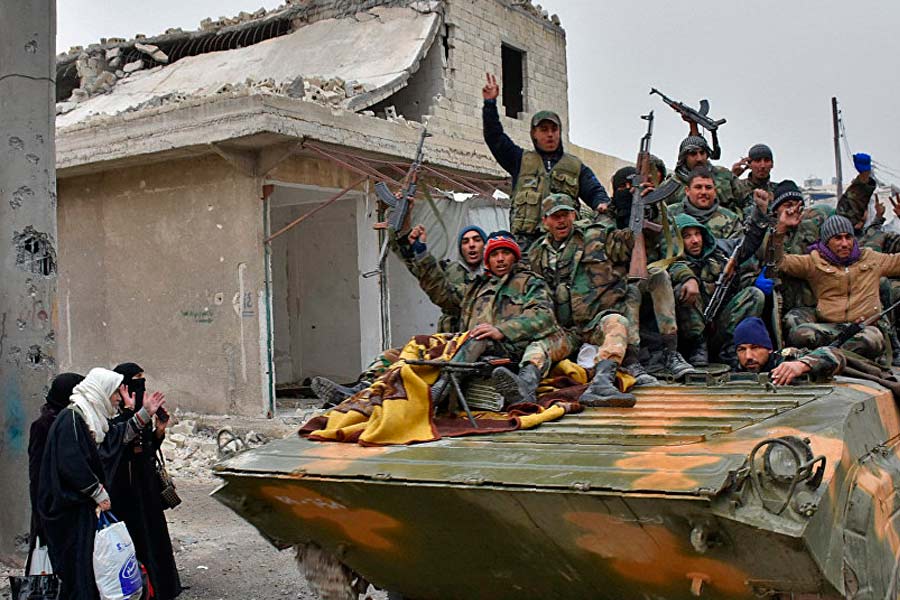
In any case, the situation changed after the US military interventions in Iraq and Syria. The overthrow of Saddam Hussein and the invasion of the military forces of the US, Britain and their allies did not stabilise the situation by any means. The invading forces tried to build a political administration to suit themselves, which was reduced to the capital, Baghdad, and a few major cities, while military activity against the occupying forces multiplied across the country. Iran intervened by forging its own militias, and fundamentalist organisations such as Al Qaeda also emerged in force. In this context Iraq's Kurdish forces, dominated by a bourgeois elite with very definite economic interests, embarked on an operation to control the vast oil fields in their territories and made extensive agreements with US companies to illegally take oil out of the country. Clearly none of this was done without Washington's political supervision.
The outbreak of the revolutionary crisis in Syria throughout 2011, as part of the Arab Spring, put the hated Assad dictatorship on the ropes. The uprising of the Syrian population, with general strikes and mass demonstrations, occupations of factories and cities, and finally armed struggle led by hundreds of revolutionary committees against the regime's hired assassins and troops alarmed all the powers with interests in the area, from the US to Israel, and of course Russia and China.
In that revolutionary crisis, the Kurdish people played a vanguard role in an exemplary struggle. It was the brutal repression unleashed by Assad throughout the country that accelerated a bloody civil war from 2012-2013, and created chaotic conditions that the US, Israel, Turkey, Iran and Russia itself took advantage of to intervene. The popular revolution was definitively crushed and derailed.
As is well known, the support of Tehran, and above all Moscow, was decisive in sustaining Assad and defeating the Islamic State. For their part, Washington, Tel Aviv and Ankara funded and armed ISIS and Al Qaeda and later its offshoots HTS and ENS. The result was a spiral of destruction, reactionary and sectarian violence that by 2022 had resulted in almost half a million dead, 6.8 million internally displaced persons and 5.2 million refugees in other countries.
In this context an unprecedented military and political agreement crystallised between US imperialism and the People's Protection Units (YPG) and Women's Defence Units (YPJ), which are the core part of the Syrian Democratic Forces, a name agreed with Washington since 2014 to combat the Islamic State militarily. At the time, ISIS was escaping Washington's control, its growth in influence and military capability was a threat to its former mentors, and it had a political agenda of its own: to extend its ‘caliphate’ across Syria, Iraq and the Middle East as a whole.
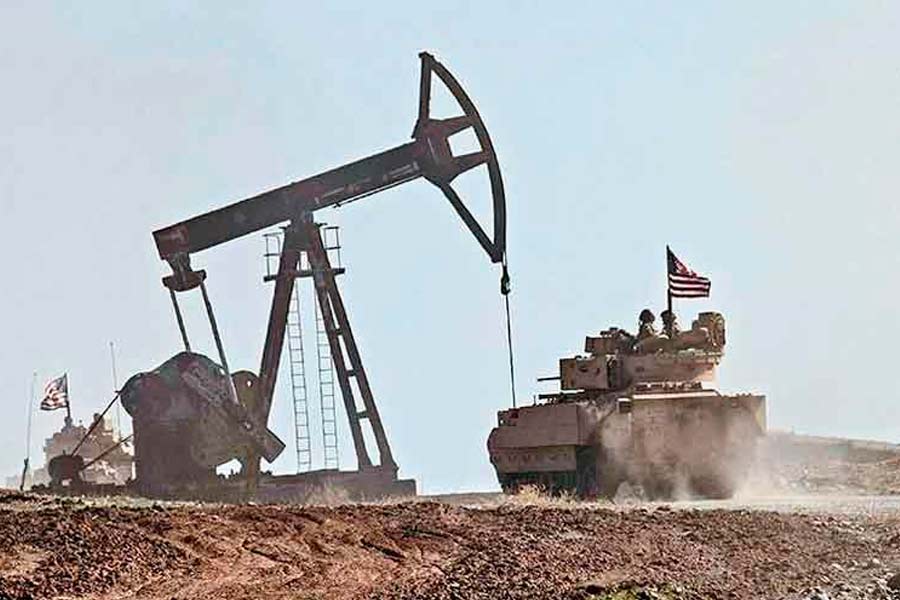
This new alliance was forged at a time when the PKK's ideological turn was gaining momentum, and when its top leader, Abdullah Öcalan, sentenced to life imprisonment by Erdogan's justice system, raised the possibility of opening peace negotiations with the Turkish regime. The latter failed in the face of Ankara's manifest intransigence and its demand for unconditional disarmament of the PKK, which was tantamount to complete surrender. From that date onwards, armed activity resumed, albeit at a much lower intensity within Turkish borders, while the main activity was concentrated inside Syria.
It is an internationally recognised fact that YPG and YPJ militiamen and militiamen fought valiantly against the Islamic State, defeating it in several battles and gaining control of a 50,000 km strip of land in north-eastern Syria. These victories opened up new perspectives for the liberation struggle of the Kurdish people and generated great internationalist solidarity around the world.
The laws declaring a secular democratic confederation, with gender equality and respect for all ethnicities and religions made Rojava a beacon of hope for millions of oppressed people in Syria, in the Middle East and also in Turkey itself.
In 2015 and 2016, the united front of the Kurds and sections of the Turkish left (HDP) won historic support in the elections. The possibilities were maturing for the PKK and its allies to use all that strength to raise a revolutionary, communist alternative, calling all workers in Turkey and the Middle East to the struggle for socialism. Rojava could have gone from being a heroic symbol, to a formidable lever for spreading revolution and effectively combating Zionism, fundamentalism and all their Western backers. But things have not developed in this way, far from it.
The death trap of the pacts with the US
The political evolution from Stalinism towards a ‘libertarian and confederal socialism’ led by Abdullah ‘Apo’ Öcalan has had important consequences that we cannot deal with in depth in this article. But the incorporation of the struggle for women's liberation into the programme of the party and the armed militias, or the social and democratic gains in Rojava, contrast eloquently with experiences such as those of Hamas in Gaza, the PNA in the West Bank, or Hezbollah in Lebanon.
It is clear that with Russia's intervention in Syria and the restoration of al-Assad's temporary authority, Washington needed troops on the ground with combat capability to contain the fundamentalists within limits. Another detail that did not go unnoticed in the calculations of US imperialism was that the Kurds were Erdogan's enemies, and manoeuvring using their support could be used to negotiate with the Turkish regime and put pressure on it if it went too far in its dealings with Russia.
The collaboration between the Kurdish militias and Washington has turned out negatively for the forces in Rojava. While 11,000 militia men and women have fallen on the various battlefronts, the US military fighting alongside them on the ground have suffered only eight casualties. But the worst thing is the political concessions it has entailed: first and foremost, the renunciation of consistent socialist and even anti-imperialist measures. Economic reforms have been very limited, and because the merchants and landowners and business owners are seen as key allies, the conditions of exploitation and oppression have been maintained for hundreds of thousands of people.
Capitalist accumulation and private enrichment has not disappeared, however much they want to present the Rojava constitution adopted in 2014 as proof of the triumph of autonomous and self-managed communes.[4] The Rojava constitution was adopted in 2014.
But there are more problems. In exchange for arms and money, the Americans have managed to set up prisons and concentration camps in Rojava, such as Al Hol, where initially a few thousand ISIS fighters were imprisoned and where today more than 60,000 men, women and children are living, creating a focus of unrest and even a resurgence of fundamentalism.[5] In addition, as in Iraq, the Kurdish leaders in Rojava have made very profitable deals with US companies to export crude oil from the oil fields they control.
Moreover, as in Iraq, the Kurdish leaders of Rojava have made very profitable deals with US companies to export crude oil from the oil fields they control.[6] Obviously it makes no sense to deny that the people of Rojava have a right to economic resources, but that is not the point. The economic alliance with US companies is not free: the guarantee is the maintenance of the military alliance with the US and political subordination to the interests of the State Department. And these can change at any time, as is becoming clear.
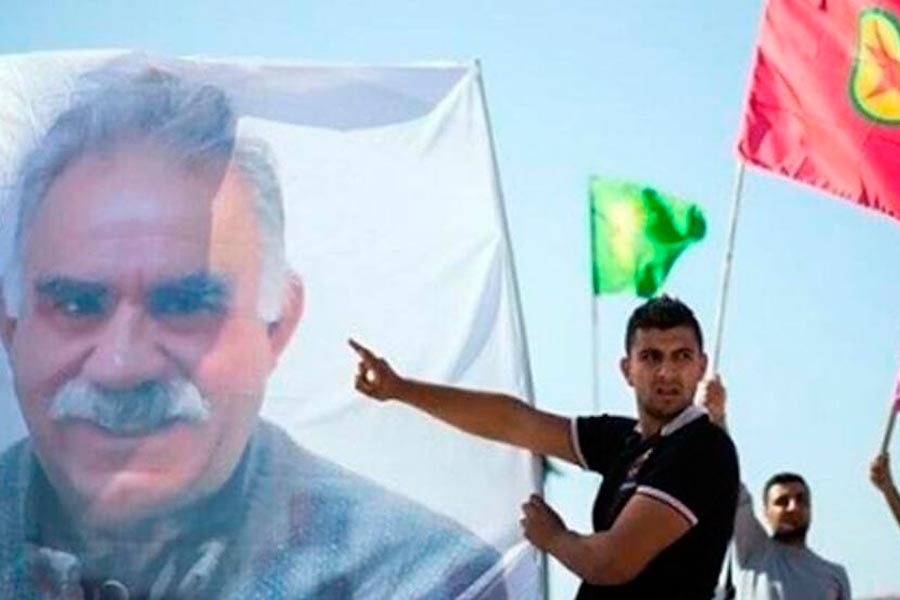
As so often in history, the perspective of socialist revolution has been truncated by tactical calculations based on alleged ‘geo-strategic realism’. And the consequences of this have been very negative. In order to ensure the survival of Rojava, the Kurdish leadership has made its pacts with Washington the cornerstone of its action. But in reality this was a mirage. The US has used the Kurdish militias for its own purposes, and will now unceremoniously sacrifice them, allowing Erdogan and his military to make a killing.
This mistake, of placing military action above all other considerations, leads to other facts. The internationalist and socialist policy is replaced by diplomatic agreements in order not to displease the imperialist power that guarantees your armament. In the end, replacing a revolutionary and internationalist policy with manoeuvres from above with the imperialists will only sow demoralisation in the Kurdish ranks.
While the fundamentalist fascists of HTS and ENS form a new government in Damascus that will be a nightmare for the masses, and will act on the decisive issues as a pawn of the US, Israel and Turkey, the military leader of Rojava, Mazloun Abdi, has publicly advocated participating in that government and dissolving the Kurdish militias into a unified Syrian army under fundamentalist and imperialist control:
‘We are ready, in the framework of a ceasefire, to withdraw our forces from Kobane and make way for security forces under the supervision of entities such as the United States. We are discussing this issue with the Americans, and they are discussing this proposal with Turkey. We do not yet know what policy the new US administration will pursue in Syria. We are in constant communication with various elected representatives from all sides in the US. We are asking for their help in pressuring the Turks to stop their offensive. But we are not only talking to the Americans, we are also in contact with our other partners and friends in the international coalition. Finally, we call on the new central government in Damascus to do its duty by working for a ceasefire throughout Syria (...)
So far, the statements of the new administration in Damascus are positive and we welcome them. HTS does not want to establish an authoritarian regime, as was the case under al-Assad, nor do we want a federal regime, nor do we want the partition of the country. We want to be part of Syria, and we want the representatives of this province and this region to participate fully in the political process so that together we can build a new Syria"[7].
However much they may be dressed up, these arguments are a complete capitulation. Syrian Kurdistan will never be free from the hand of the jihadist forces in control of Damascus, the US or Israel. To think that with such displays of subordination they can convince Washington to stop Turkey's military offensive on Rojava is utter folly, to put it mildly.
It is also no coincidence that these statements by Rojava's top military leaders come at a time when a delegation met Öcalan for the first time in a decade at the prison on the island of Imrali in the Sea of Marmara, some 50 kilometres from Istanbul.
Öcalan received on Saturday 28 December MPs Sirri Süreyya Önder and Pervin Buldan, two historical figures of the DEM party (formerly known as HDP) who were already part of the delegation of the pro-Kurdish party (then known by the acronym BDP) that in 2013 met with him and which they represented in the subsequent peace negotiations.
The prison meeting comes after the leader of the ultra-nationalist and far-right MHP, Devlet Bahçeli, the main ally of President Erdogan's ruling AKP, proposed inviting Öcalan to the Turkish parliament to announce ‘the dissolution of the PKK’.
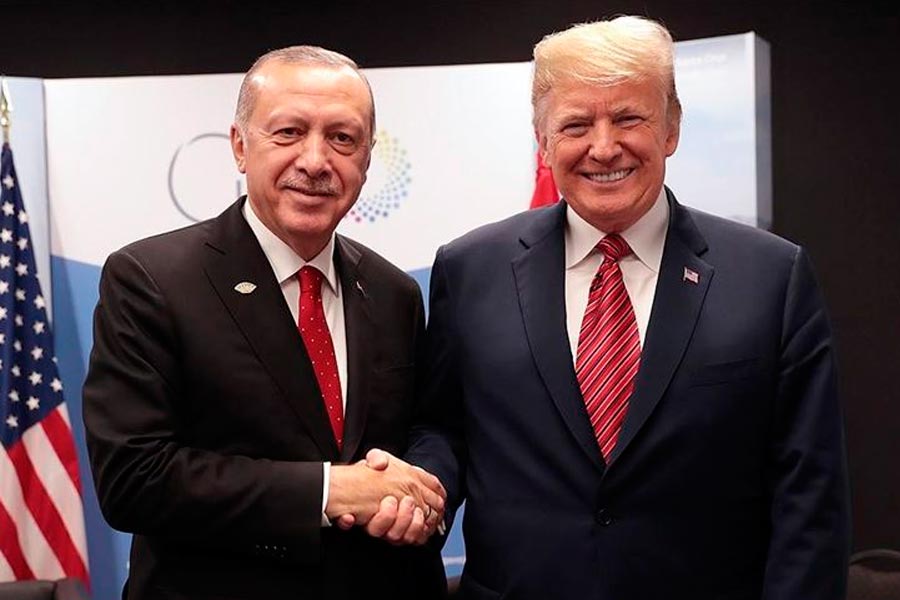
In the communiqué issued by the two Kurdish Members, Öcalan's words are precisely stated. We reproduce it textually:
"To the Press and the Public,
On 28 December 2024, we held a comprehensive meeting with Mr Abdullah Öcalan on the island of Imrali. His health is good and his morals are quite high. His assessments of the search for a permanent solution to the Kurdish question were of vital importance.
At the meeting, which also assessed recent developments in the Middle East and Turkey, he said: Öcalan presented positive solutions to counter the dark future scenarios imposed.
The general framework of their reflections and approaches is as follows:
The strengthening of the Turkish-Kurdish brotherhood is not only a historical responsibility, but has become critical and urgent for the destiny of all peoples. For the success of this process, it is essential that all political circles in Turkey take the lead without being caught up in close and short-term calculations, act constructively and contribute positively. One of the most important platforms for these contributions will certainly be the Great National Assembly of Turkey (TBMM).
The events in Gaza and Syria have shown that this issue, which external interventions have tried to exacerbate to a chronic crisis, cannot be postponed for any longer. The contributions and proposals of the opposition are also valuable for achieving a solution proportionate to the gravity of this matter.
I have the competence and determination to make the necessary positive contribution to the new paradigm reinforced by Mr. Bahçeli and Mr. Erdoğan.
The delegation will share this approach with State and political circles. In view of this, I am prepared to take the necessary positive step and to make the call.
All these efforts will raise the country to its appropriate level and will also serve as a very valuable guide for democratic transformation.
This is the era of peace, democracy and fraternity for Turkey and the region.
With respect to the public, Pervin Buldan and Sırrrı Süreyya Önder, 29 December 2024. "[8]
The statement leaves little room for speculation. It seems that the PKK leader is ready to make the greatest political concessions to Ankara.
For years, sectors of the left and groups that declare themselves anarchists and Trotskyists have idealized the leaders of Rojava, closing their eyes to the mortal danger posed by their policy of putting the fate of the Kurdish struggle into the hands of a force as criminal and reactionary as U.S. imperialism.
If the US wants (and can) to convince Erdogan to accept the surrender that Abdi proposes, the result can only be the total subordination of the Kurdish forces to imperialism and a degeneration and corruption as we see in the Palestinian National Authority. Or worse if it is possible: to end up on the same ground as the Kurdish reactionary regime controlled by the Barzani family in northern Iraq, which did not hesitate to be an accomplice to the bloody American occupation and continues to dance to the are that mark the US, Israel and even the Turkish regime. In short, a defeat that does not deserve the generations of fighters and martyrs of the Kurdish cause.
The great imperialist game in Syria and the fence over Rojava also respond strongly to those from the left who promote illusions in "multipolarity" and the alleged role of Chinese and Russian "imperialist friends" as a counterweight to the United States, Israel or Turkey. What has China - Israel's second trading partner - done to prevent the genocide of the Palestinian people? Absolutely nothing. What about Russia? Same. Beijing and Moscow do not carry Washington's history of death and destruction, but they are only interested in maintaining their business and areas of influence. And they deal with the Kurdish issue with the same approach.
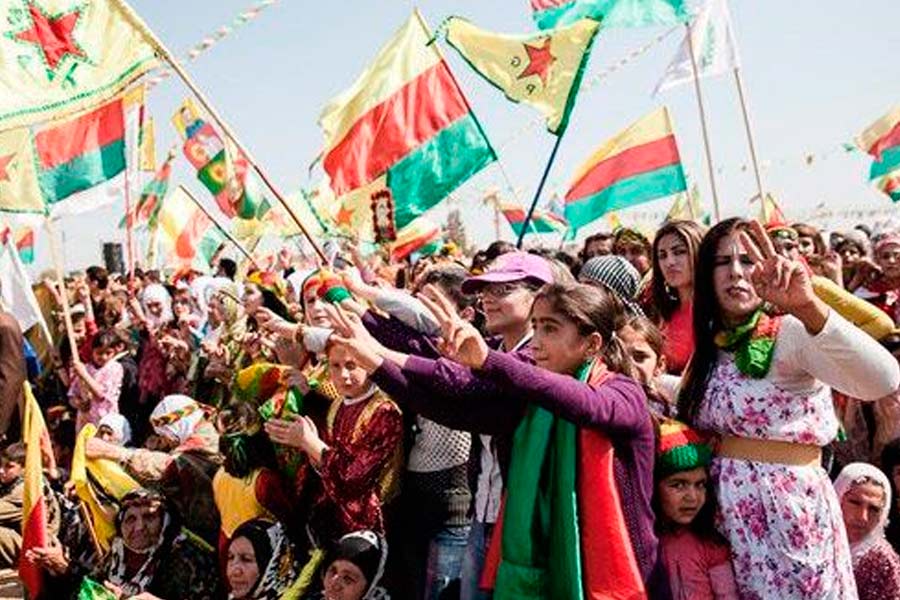
Under capitalist and imperial rule, oppressed peoples like the Kurdish or the Palestinian can only expect barbarism, wars and oppression. Any pact or commitment to the rotten bourgeoisie of the area and its imperialist mentors will be wet paper and will only sow demoralization and division, preparing new massacres and defeats. The national liberation of the Kurdish people, the right to have their own territory and independence, is closely linked to the socialist revolution and the defence of an internationalist programme.
The action of the weapons is important. But armed struggle is completely powerless if it dislinks itself from mass action, if it is not subordinated to a class and social transformation program. To end the nightmare of such destruction, genocidal Zionism, the use of ethnic, national and religious differences in reactionary wars that serve only imperialist interests, means to embrace with strength the ideas that have never failed the oppressed, those of true revolutionary communism, and to fight for a Socialist Federation of the Middle East.







